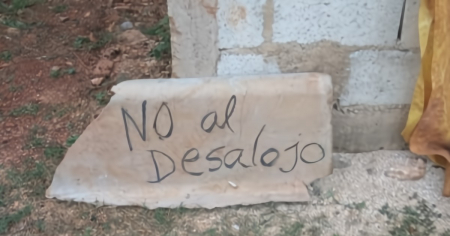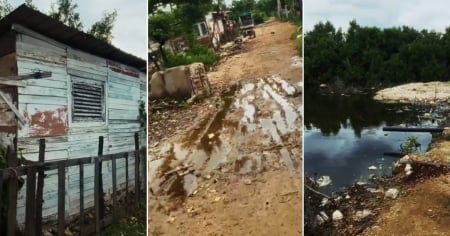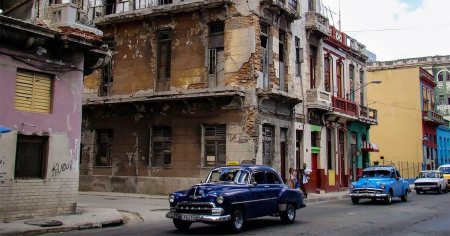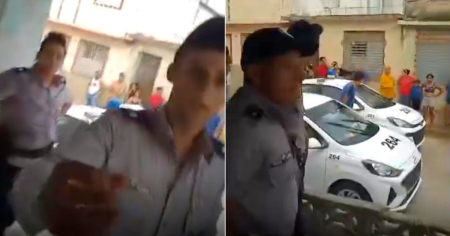Yanisley Oliva Díaz, a Cuban mother of three young children, reported on social media last Thursday that the electric company removed the meter from her home, leaving her unable to cook food for her children, as a pressure tactic to force her to vacate the state property she occupies in Las Tunas.
In a post on Facebook, Oliva explained that she decided to occupy the property after more than two years of requesting housing assistance, without receiving an effective response.

According to her, the building was abandoned, and only one office was used on the premises once a month, while the rest of the property contained unprotected documents and belongings.
She assured that she did not force or break anything to enter, as the backdoor was ajar with the key left in the lock: “I was compelled to do so,” she wrote.
Mother of three children aged 11, 5, and 2, Oliva recounted that she previously lived with her parents, her sister, her brother-in-law, and their children, a total of eleven people sharing a small house, sleeping in the living room due to lack of space.
Despite that situation, he explained that Housing officials told him that there were mothers "in greater need" and suggested he find a house on his own, promising to help him with 350,000 pesos, which he stated never arrived.
He also pointed out that he suffers from a serious medical condition: paroxysmal supraventricular tachycardia, with episodes that have required electrical cardioversion, putting his life at risk.
Her youngest daughter, who is five years old, has had health problems since she was born prematurely at eight months of gestation, and she is still awaiting an evaluation from the Diagnostic and Guidance Center (CDO) to receive specialized treatment.
Despite this, Oliva stated in her post that she has not yet received a visit from any social worker.
She also explained that she was self-employed as a manicurist but was forced to stop working due to health reasons and the effects of chemicals on her children, who are allergic.
Since then, he claims, he has been left without stable income or institutional support: “I am asking that this publication reaches the highest authorities of the country and mainly the President of the Republic, Miguel Díaz-Canel, because this is a centralized policy directed personally by him.”
The woman concluded her complaint by requesting that her electricity service be restored so she can feed her children and appealed to her family history as part of the revolutionary process, mentioning that her father, Rogelio Oliva Vargas, worked for 35 years in various positions at the Ministry of the Interior (MININT).
"Help me make my complaint public," implored the desperate mother, who accompanied the post with a series of photos that reveal the state of neglect in which she found the state-owned property, as well as videos showing the moment when the electricity was cut off.
Amid a growing wave of evictions in Cuba, the government recently announced the immediate implementation of measures against illegal occupations, directly impacting mothers with minor children who have no other housing options.
One of these mothers reported on social media that she was removed from an abandoned state facility, highlighting a more aggressive policy by the authorities, according to the statements collected last January.
This situation is neither new nor isolated. Last December, a citizen described the marginalized neighborhood they arrived in Havana as a space of houses on the verge of collapse, without stable water or electricity, where entire families survive, including single mothers and small children.
This testimony was collected in a report that starkly portrays the reality faced by those living on the fringes of the official housing system, as seen in the account of a Havana resident.
Months ago, another Cuban mother was evicted along with her daughter, four grandchildren, and a son-in-law from a house they were occupying in Havana. The woman, desperate, explained that she had nowhere to go with her family and that the promise of institutional aid never materialized.
The eviction occurred abruptly and without relocation, leaving the minors in a state of complete vulnerability.
Frequently Asked Questions about the Social and Energy Situation in Cuba
Why did the Cuban government cut off electricity to Yanisley Oliva Díaz?
The Cuban government cut off electricity to Yanisley Oliva Díaz as a pressure tactic to force her to vacate the state property she occupies in Las Tunas. Oliva had taken over the place after not receiving a response to her housing assistance requests for more than two years. This action highlights the lack of governmental support for the urgent housing needs of citizens.
What is the impact of blackouts on the daily lives of Cubans?
Power outages in Cuba severely affect the daily lives of families, limiting the ability to cook, refrigerate food, and carry out everyday tasks. Furthermore, these interruptions in the electricity supply create a significant emotional impact, especially in households with children and the elderly, who endure the heat and lack basic services, such as drinking water.
How has the international community responded to the reports of living conditions in Cuba?
The international community has shown solidarity with Cuban families, especially through social media. However, the effective response in terms of aid or political pressure has been limited, which perpetuates the critical situation that many citizens on the island are experiencing due to the energy and social crisis.
Filed under:





